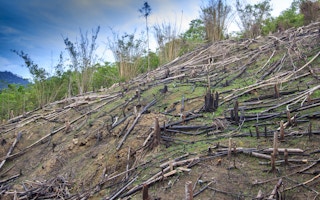Institutional investors which manage almost US$5 trillion in assets have called on the Roundtable on Sustainable Palm Oil (RSPO) to close the gaps in its certification standards, and to do so quickly.
To continue reading, subscribe to Eco‑Business.
There's something for everyone. We offer a range of subscription plans.
- Access our stories and receive our Insights Weekly newsletter with the free EB Member plan.
- Unlock unlimited access to our content and archive with EB Circle.
- Publish your content with EB Premium.
In an open letter addressed to RSPO Secretary General Darrel Webber on June 1, investors and 16 other consumer goods giants such as Procter and Gamble (P&G) and Starbucks called on RSPO to ensure that by 2016, its principles and criteria (P&C) certification were changed to include measures to protect forests.
Suggestions by the letter’s authors included requirements on the conservation of areas considered as ‘High Carbon Stock’, peatland protection, reporting in greenhouse gas emission, and ensuring that palm oil came from known sources.
The association for the US$44 billion-a-year palm oil industry should also raise its standards for company assessments on human rights standards and the conservation value of land so that they are “rigorous and objective”, said the signatories.
RSPO administers a global sustainability certification for palm oil growers who comply with their standards on socially and environmentally responsible practices.
A set of eight principles - including a commitment to transparency, conservation of natural resources, and legal compliance - and numerous other requirements constitute the ‘RSPO Standard’ for certification.
To date, RSPO has certified 12.65 million tonnes of palm oil - about 20 per cent of the total global supply. More than 90 per cent of certified palm oil originates from Malaysia and Indonesia, with Papua New Guinea, Brazil, and Colombia accounting for the remainder.
Forest protection loopholes
The certification guidelines,first introduced in 2007, have been reviewed once from 2012 to 2013, and are due for another review in 2018. The taskforce carrying out these reviews comprises growers, environmental and social NGOs, and consumer goods companies like Unilever.
The letter’s authors noted that RSPO’s certification scheme is “uniquely positioned to support, promote, and enforce the widespread uptake of responsible and sustainable production practices across the palm oil industry”.
But it in its current state, the certification “does not include protections for some of the most critical externalities of palm oil production” such as the conversion of forest and peatlands, the letter added.
Peatlands are wetlands that must be drained before cultivation. This process not only results in significant carbon emissions as peat dries and decomposes, it also increases the risk of forest fires and results in the land sinking, and eventually flooding, as it dries out.
Waiting till 2018 to plug these gaps “would be inconsistent with the imperatives of addressing deforestation, peatland conversion, and human rights violations swiftly and efficiently,” said the letter’s authors. They urged RSPO to bring the timeline forward to 2016.
“
Companies and investors increasingly recognize that widespread forest clearance degrades the environment and drives conflicts with local communities in ways that pose real risks to shareholder value.
Lucia von Reusner, shareholder advocate, Green Century Capital Management
Lucia von Reusner, shareholder advocate at Green Century Capital Management - one of the firms that organised the letter, along with the New York State Common Retirement Fund - said that companies and investors increasingly recognise that environmental degradation and conflict with local communities pose real risks to shareholder value.
“We are calling on RSPO to provide the assurance that strong protections are being upheld throughout palm oil supply chains,” she said.
RSPO acknowledged the letter as an encouraging sign of a proactive push from the business community on making sustainable palm oil the norm.
Stefano Savi, acting communication director, RSPO, said that the multi-stakeholder nature of RSPO meant that “at times, compromises are necessary to move forward and ensure buy-in of all stakeholder groups represented within the RSPO”.
In addition to supporting best practices in the industry, the system also helped companies who were still trying to improve their sustainability standards, he added.
He pointed to a set of voluntary rules introduced in May by RSPO to enhance their standards on deforestation, peatland, and indigenous people’s rights, among other issues. These standards, known as RSPO+, are voluntary.
Savi promised that RSPO was “taking all constructive comments on board,” and expressed confidence that a market transformation towards sustainable palm oil would be possible.
Environmental groups welcomed the investors’ letter too, saying it reinforced a message they had been trying to send to RSPO for a long time.
Marcus Colchester, senior policy advisor of UK environmental group Forest People’s Programme told Eco-Business that as one of the members of the P&C review task force, he was “profoundly disappointed by the way Indonesian and Malaysian growers blocked RSPO from adopting higher standards during the 2012-2013 revision process”.
This has led to sustainable palm oil initiatives outside the RSPO such as the Palm Oil Innovators’ Group, the Sustainable Palm Oil Manifesto and the Indonesian Palm Oil Pledge, he added. All these are voluntary initiatives by palm oil companies and green groups to raise forest protection standards within the industry.
But ultimately, what matters most is compliance, said Colchester.
“None of these standards and declarations of intent mean anything if, on the ground, we continue to see forests despoiled, people shunted aside and lands taken without communities’ consent by aggressive planters,” he said.

















